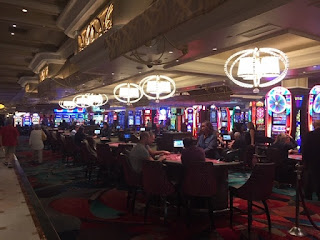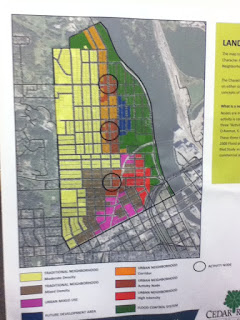 |
| Bellagio Las Vegas: Will slots ring where pancakes once were served? |
Ten years ago this month, I listened to a Strong Towns interview with Steven Shultis of Springfield, Massachusetts. Shultis, then the author of the Rational Urbanism blog, defended a deal that had brought a casino to his city. It led me to compare the features he liked about the Springfield casino with the Cedar Rapids downtown casino proposal. The resulting post, entitled "Their Casino, Our Casino," marveled that Springfield, a down-on-its-luck post-industrial city, got a much better deal both in terms of revenue and design, than Cedar Rapids did.
Economic studies, once you exclude industry-sponsored work, are extremely cautious about the local impacts of casinos. (See the review of research by the Richmond Federal Reserve District (Scavette 2022.)) Mike Walden of North Carolina State University summarizes the reasons for caution (Liotta 2019):
Obviously the economy questions: Will people come to gamble in your small town? For example, [even] if this is going into a small town there are lots of opportunities for gambling, not just going to Las Vegas or Atlantic City, but online, on your phone, et cetera. So that's one question, will new people come?
The spending would need to be new to the local economy, not money currently being spent at other venues ("substitutability").
You don't just want to build this off your existing population because what happens generally is if someone is already a resident in your small town, and they're going to spend money gambling, that means they're not spending the money somewhere else [in town]. So the whole point here is to attract people from outside.
Another factor is whether attendant social problems (addiction, crime) counteract the small increase in economic activity.
Will people flock to the casino on 1st Street NW in impactful numbers? Probably not. Nationwide, counties that open gambling venues see only marginal economic improvement compared to neighboring counties without those venues (Lim 2017, Radhakrishnan 2015). Even a gambling destination like Atlantic City "has difficulty keeping a single grocery store open" (Scavette 2022, citing Burch 2021).
Cedar Rapids is not a small town, we already have grocery stores, and our economy is not struggling. So it's safe to say we will not be Vegas on the Cedar, whether that's a good thing or a bad thing. But businesses aren't required to be transformative before they open. Visions of tourism glory set aside, is there any reason to dislike this project? Alas, yes.
 |
| story board, 2017 Northwest side open house |
As with First and First, anyone with imagination can come up with multiple projects for this territory that would blend more with the existing neighborhood and produce more return for the city: missing middle housing, a school, a corner grocery store and pharmacy, a hotel, a park, a downtown-scaled Target like the one just opened in Iowa City... anything really that wouldn't rely so heavily on out-of-town traffic and (gulp!) parking. Imagine Clinton's Wild Rose Casino--appropriately and conveniently located on the outskirts of town--plopped onto a large portion of our town's most valuable land. Make sure you have plenty of antacid before you do this, though.
The deal with Peninsula Pacific Entertainment is less advantageous to the city. In 2013, I thought we'd sold short compared to Springfield, but this version sells even shorter. Compared to the 2013 proposal, the footprint is bigger, the number of competing venues is greater, and the much-touted charitable donations the group has promised are lower. (I'm no movie expert, but I know the difference between net and gross!)
|
FEATURE |
SPRINGFIELD |
CR 2013 |
CR 2023 |
|
Street
Position |
Multiple pods within existing street grid |
One pod on
one megablock |
One pod on even
bigger megablock |
|
Housing
feature |
54
market-rate apartments |
None |
None |
|
Additional
amenities |
Bowling
alley, movie theater (won’t compete with existing venues) |
Restaurants,
event center (competing with existing venues) |
Bars,
restaurants, event center, “foodertainment” center (competing with existing
venues) |
|
Annual taxation |
$26 million |
·
$1.2 million + 1 percent of gross receipts ·
charitable donation of 3 percent of gross
receipts |
·
Wagering tax information not found and may not have been
decided ·
Charitable donation of 8 percent of net
receipts |
|
Legal status |
Provisions
fixed by voter-approved measure |
Provisions
evolving |
Provisions evolving |
|
Transportation |
Casino
workers can take bus to work, close to transit center |
Limited bus
service, not close to transit center |
Limited bus
service, far from transit center |
I expect the Linn County Casino is going to be built, and the results will not be all bad. However, despite its primo location the casino won't enhance the emerging urbanism of downtown Cedar Rapids, nor will it provide much needed connectedness between downtown and the near west side neighborhoods. How did Springfield, which is clearly in more desperate shape than Cedar Rapids, manage to swing such a favorable, far-sighted deal? How did Cedar Rapids manage to miss this opportunity?
SEE ALSO: Jim Kinney, "Taking Stock of MGM Springfield, Five Years Later," MassLive, 20 August 2023




No comments:
Post a Comment